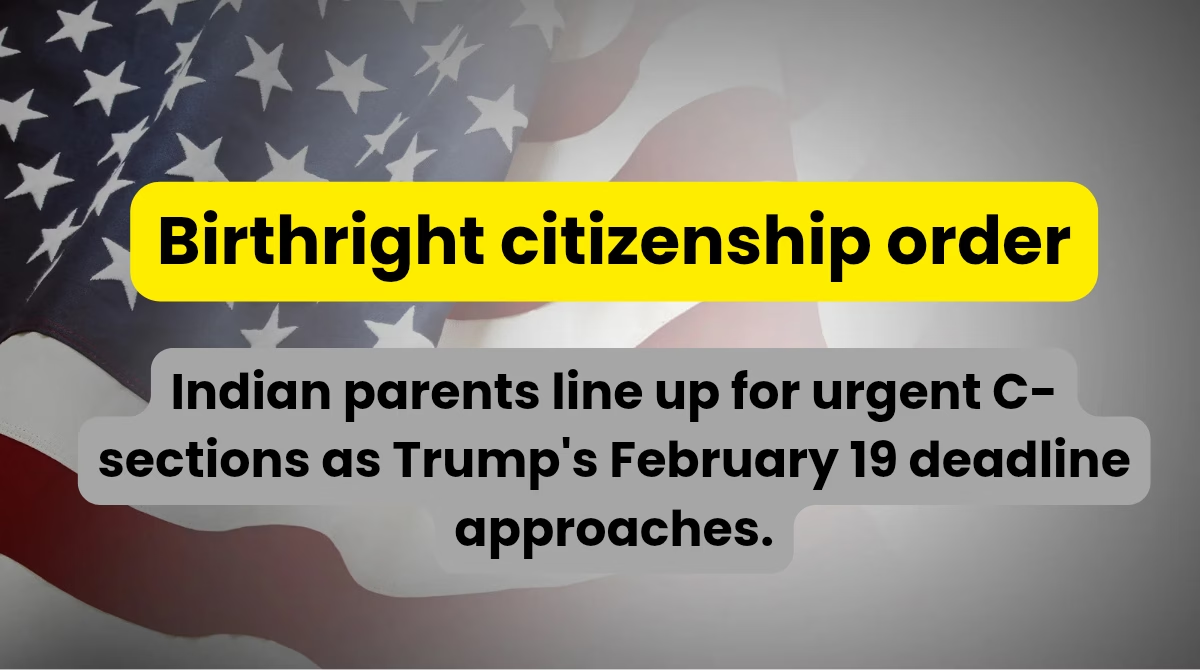New birthright citizens order 2025: As February 19, 2025 gets closer, there are many Indian parents in the U.S. feeling anxious and worried about the new rule on birthright citizenship signed by President Donald Trump. This rule was signed on January 20, 2025 to not permit birthright citizenship to babies born in the U.S. if their parents are not citizens of the United States. It has raised a lot of confusion and fear among immigrant families, especially those who come to the U.S. to give birth and have their child become a citizen.
Background of the Executive Order
On January 20, 2025, President Donald Trump signed a order called “Protecting the Meaning and Value of American Citizenship”. This new rule is that only if one or both parents are U.S. citizens or legal permanent residents (green card holders) will babies born in the U.S. get U.S. citizenship. This change could have a huge impact because it may deny U.S. citizenship to more than 150,000 babies born each year to parents who are not U.S. citizens.
Key Points of the Order:
- Restriction on Citizenship: Children born after February 19, 2025, will not automatically get U.S. citizenship if one or both parents are U.S. citizens or legal permanent residents (green card holders).
- Impact on Birth Tourism: The order primarily affects families from countries like India who travel to the U.S.
- Legal Challenges: The new rule has already led to legal battles, as several states have filed lawsuits against it. They argue that the rule goes against the 14th Amendment of the U.S. Constitution, which guarantees citizenship to anyone born in the U.S., no matter who their parents are.
Current legal status for new birthright citizens order
According to the latest update federal judge has temporarily blocked Trump’s executive order to be implemented . Judge John Coughenour described the order as “blatantly unconstitutional,”because it undermines a fundamental principle of American law established by the 14th Amendment. This has up lift the burden of confused and fear among immigrant families, especially those who come to the U.S. to give birth and have their child become a citizen.
Concerns Among Indian Families related to new birthright citizens order

Many Indian families in the U.S. are feeling scared and uncertain about this new rule. There are over 5 million people of Indian origin living in the U.S., and many worry about their children’s future and their chances of becoming U.S. citizens.
Parents who are in the U.S. on temporary work visas like H-1B (for jobs) or F-1 (for students) are especially worried. They are unsure how this rule will affect their child’s citizenship if they are born in the U.S.
Impact on Families
- Losing Important Benefits: Without automatic U.S. citizenship, children might not qualify for benefits like lower in-state tuition fees for college or federal financial aid for education.
- Long-Term Uncertainty: Families already waiting for a green card (which can take many years) are at higher risk. If their child is born outside the U.S., they could face difficulties staying in the country when they turn 21, unless they get a different visa.
Conclusion
As February 19, 2025 gets closer, there are many Indian parents in the U.S. feeling anxious and worried about the new rule on birthright citizenship signed by President Donald While According to the latest update federal judge has temporarily blocked.Trump plans to challenge this decision in higher courts, so the fight over birthright citizenship is not over yet.
The situation is constantly changing, as immigrant rights groups and state lawyers get ready for more court battles. This case could become one of the most important legal decisions about immigration and citizenship in the U.S. The final ruling will not only impact current immigrant families but also influence American citizenship laws for future generations.
OPSCRECRUITMENT.IN
